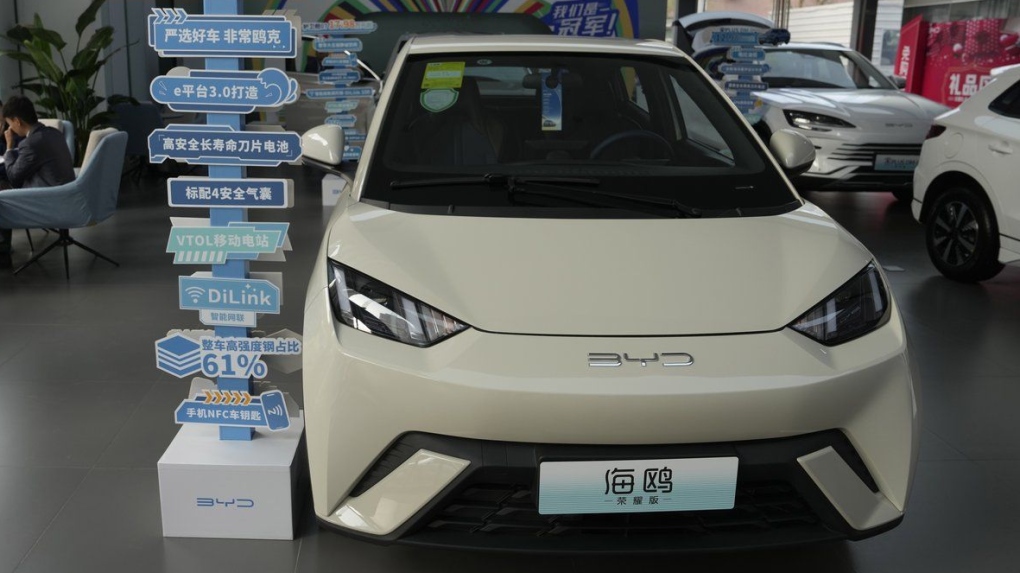The compact and robust Seagull, an electric vehicle (EV) from China, presents a significant challenge to the United States’ automobile sector

The introduction of a small, affordable electric vehicle named the Seagull has stirred concerns among American automakers and policymakers.
Manufactured by Chinese automaker BYD and released last year, the Seagull is priced around $12,000 in China. Despite its low cost, the vehicle boasts impressive performance and is assembled with a level of craftsmanship comparable to U.S.-made electric vehicles that are priced three times higher. A variant with a shorter range is available for under $10,000.
Currently, tariffs on imported Chinese vehicles are likely to prevent the Seagull from entering the American market, and if it were imported, its price would likely exceed $12,000.
However, the rapid emergence of affordable EVs from China has the potential to disrupt the global auto industry in a manner reminiscent of the impact Japanese automakers had during the oil crises of the 1970s. BYD, short for “Build Your Dreams,” could pose a significant challenge to the U.S. auto industry.
Sam Fiorani, a vice president at AutoForecast Solutions near Philadelphia, emphasized the importance of recognizing BYD as a competitor, stating, “Any car company that’s not paying attention to them as a competitor is going to be lost when they hit their market. BYD’s entry into the U.S. market isn’t an if. It’s a when.”
U.S. officials and manufacturers are increasingly viewing Chinese electric vehicles (EVs) as a serious threat. The Biden administration is expected to announce 100% tariffs on imported Chinese EVs, citing concerns about their impact on U.S. jobs and national security.
The Alliance for American Manufacturing has warned that government-subsidized Chinese EVs could have devastating effects on the U.S. auto sector. Tesla CEO Elon Musk has also acknowledged the quality of Chinese EVs, stating that without trade barriers, they could dominate the global market.
Unlike many Western markets where EVs are often expensive and targeted at a niche market, Chinese brands are offering affordable options that appeal to a broader audience. This approach aligns with the push by governments worldwide to shift away from gasoline-powered vehicles to combat climate change.
Bill Russo, founder of Automobility Ltd. in Shanghai, noted the difference in approach, stating, “The Western markets did not democratize EVs. They gentrified EVs. And when you gentrify, you limit the size of the market. China is all about democratizing EVs, and that’s what will ultimately lead Chinese companies to be successful as they go global.”
The entry of the Seagull into the U.S. market has prompted reflection within the U.S. auto industry. Terry Woychowski, President of Caresoft Global, described the Seagull as a “clarion call” for the industry, highlighting the need for radical changes to compete with China in designing low-cost EVs.
BYD’s ability to produce the Seagull at a low cost is attributed to various factors. These include BYD’s expertise in battery manufacturing, particularly using lithium iron phosphate chemistry, which is cost-effective but offers lower range compared to traditional lithium-ion batteries. Additionally, BYD’s vertical integration and in-house production of many vehicle components contribute to cost savings.
Woychowski emphasized the importance of rethinking design and engineering practices to compete with Chinese EVs. U.S. automakers need to prioritize efficiency and cost-effectiveness in their designs, shedding outdated practices from a century of vehicle manufacturing.
Despite its minimalist design, the Seagull offers a quality feel with solid construction and thoughtful details. It demonstrates impressive performance and handling, comparable to more expensive electric vehicles.

